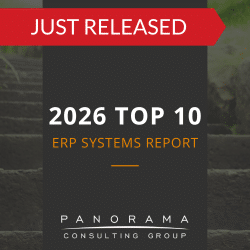- Manufacturing IT failures often arise from technology initiatives that fail to support organizational objectives, leading to operational disruptions and inefficiencies.
- Resistance to new systems and insufficient training contribute significantly to the failure of ERP implementations and other technologies.
- Over-customization, data migration issues, and vendor mismatches are common causes of ERP failures in manufacturing.
- Outdated technology hinders scalability and integration with modern solutions, exacerbating operational challenges.
- Poor data governance and systems that cannot adapt to evolving demands leave manufacturers vulnerable to disruptions and competitive disadvantages.
In the fast-paced manufacturing sector, technology should act as a cornerstone for innovation and efficiency. Yet, IT failures in this industry are alarmingly common, derailing operations, eroding profitability, and dampening stakeholder confidence.
Whether it’s a comprehensive manufacturing ERP system failure, a breakdown in supply chain management (SCM) software, or inadequate integration of AI in ERP, such failures rarely occur in isolation. Instead, they are symptoms of deeper organizational challenges.
Today, we’ll examine the leading causes of manufacturing IT failures, with an emphasis on manufacturing software failures.
Why Do IT Failures Persist in Manufacturing?
Manufacturers face unique challenges: complex supply chains, demanding production schedules, and fierce global competition. Technology solutions, such as ERP systems, SCM software, and AI-powered tools, promise to streamline these complexities. Yet, despite these advancements, manufacturing technology failures remain prevalent.
The reasons are multifaceted, stemming from a combination of strategic missteps, organizational resistance, and technological limitations. Here are the failure points you must anticipate to minimize IT risks.
1. Lack of Strategic Alignment Between IT and Business Goals
For example, a manufacturer might implement an advanced SCM system without first assessing its compatibility with existing processes or workforce capabilities. This lack of foresight can lead to disruptions in supply chain operations, delayed deliveries, and lost revenue.
To mitigate this, leaders must:
A Failed Payroll System Implementation
Panorama’s Expert Witness team was retained to provide a forensic analysis and written report to the court regarding the failed implementation of a major software developer’s ERP/payroll system.
2. Inadequate Change Management Strategies
Technology change is inherently disruptive. When organizations fail to prepare their teams adequately, even the best-designed systems can falter. Resistance from employees can undermine the adoption of new tools.
Consider a manufacturer rolling out an AI-powered ERP system designed to optimize production planning. Without proper training and communication, employees might revert to legacy processes, rendering the new system ineffective. This not only wastes time and resources but also contributes to ERP failures.
Effective change management involves:
3. Underestimating the Complexity of ERP Implementations
ERP systems promise end-to-end visibility and efficiency across manufacturing operations, but their complexity often leads to ERP software failures during implementation.
Common pitfalls include:
- Over-customization: Excessive customization can lead to budget overruns and integration complexities.
- Data migration challenges: Poor data quality and inadequate migration strategies can cause operational disruptions and impede data-driven decision-making.
- Vendor misalignment: Selecting a vendor without sufficient expertise in manufacturing-specific processes can result in a mismatch between the software’s capabilities and the organization’s needs.
A thorough ERP evaluation is critical to avoid these challenges. Our ERP consulting company can recommend solutions tailored to the unique demands of manufacturing.
4. Over-Reliance on Legacy Systems
Legacy systems, while often reliable, lack the flexibility and scalability needed for modern manufacturing challenges. Continuing to rely on outdated technology increases the risk of manufacturing software failures, particularly when attempting to integrate new solutions.
For instance, an outdated inventory management system may struggle to interface with an advanced supply chain software platform, resulting in data silos and inefficient workflows. These inefficiencies can snowball into significant disruptions, particularly during periods of high demand.
To avoid this, manufacturers can:
5. Insufficient Testing and Quality Assurance
For example, a manufacturer might implement a new SCM system to optimize procurement. However, insufficient testing causes the system to miscalculate inventory needs, resulting in overstocking and financial losses.
To mitigate such risks, leaders should:
6. Neglecting Cybersecurity and Data Governance
Additionally, poor data governance can exacerbate manufacturing IT failures by compromising the accuracy and reliability of critical information.
For example, a manufacturer implementing a cloud-based ERP system without ensuring robust security protocols may expose sensitive data to unauthorized access. This not only risks compliance violations but also undermines trust with partners and customers.
To address this challenge, manufacturers must:
7. Overlooking Scalability and Future-Proofing
For instance, a manufacturer deploying an on-premises SCM platform incapable of adapting to sudden shifts, may struggle to accommodate spikes in demand or comply with new trade policies. This rigidity can hinder growth and erode competitive advantage.
To future-proof IT investments, organizations should:
Turning IT Challenges into Opportunities
The manufacturing industry’s reliance on technology is both its greatest strength and its most significant vulnerability. While the potential for manufacturing technology failures is undeniable, these risks can be mitigated with strategic foresight, disciplined execution, and expert guidance.
By aligning IT investments with business goals, prioritizing change management, and partnering with an experienced enterprise software consultant, you can transform IT challenges into opportunities for innovation and growth. Contact us below for a free ERP consultation.















